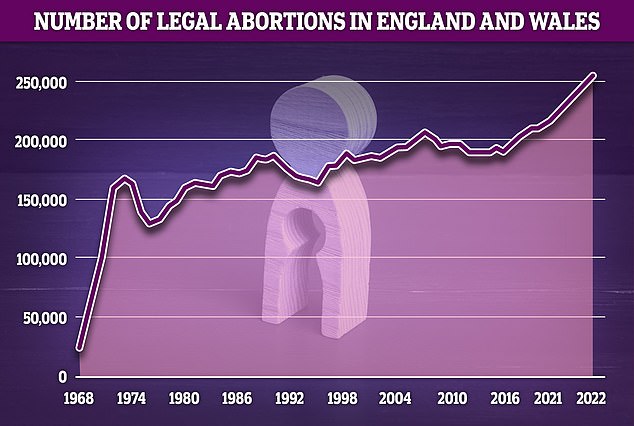A record 252,122 abortions were recorded in England and Wales in 2022, with Britain’s cost of living crisis to blame, according to charities.
This figure is about 17 per cent higher than the previous year, itself another record breaker since the Abortion Act was introduced in the 60s.
It’s equivalent to one in every 50 women in England and Wales between the age of 15 to 44 having a termination.
Women aged 22 were the most likely to have an abortion in 2022, at almost 38 terminations, per 1,000 women nearly double the national average.
Charities said the ‘unprecedented’ spike in pregnancies in ending termination was the cost of living making it unaffordable for many women to have a child.
Heidi Stewart, chief executive of the British Pregnancy Advisory Service (BPAS), which provides abortion said: ‘No woman should have to end a pregnancy she would otherwise have continued purely for financial reasons.


A record 252,122 abortions were recorded in England and Wales in 2022, with Britain’s cost of living crisis to blame, according to charities
‘The stories women have shared with us are heartbreaking. The costs of living crisis has placed immense strain on women and families, with too many having to choose between financial stability and having a baby.
‘With the second highest childcare costs in the developed world, whichever party is elected come 4 July needs to prioritise curbing the cost of living and making childcare more affordable.’
She added another reason was long NHS waits for contraceptive appointments meaning women were becoming pregnant without wanting to, leaving abortion their only option.
‘No woman should become pregnant because healthcare services are failing to provide women with the contraception they want and need, when they need it,’ she said.
Official abortion data, published by the Department of Health and Social Care, also recorded that 82 per cent of women who had terminations were unmarried, a figure that has remained constant for the past decade.
Women in the North West had the highest rate of abortion, at 24.2 terminations per 1,000 women.
In contrast, the South West has the lowest rate at 17.6 abortions per 1,000 women.
The vast majority, 88 per cent, of abortions performed in 2022 were performed under 10 weeks.
Such terminations can be carried out at home using medications and this has become an increasingly frequent way to end a pregnancy in the UK, with 61 per cent of terminations done this way according to Government data.
This is up 9 percentage points compared to the previous year’s figure.
Current rules mean pregnant women can legally request an abortion in the UK until 24 weeks pregnant, but it is up to medics if it is granted.
Under the 1967 Abortion Act terminations are granted on grounds of physical or mental health as well as for financial reasons, such as being unable to afford to care for a child.
There is no access to abortion on demand in the UK. A woman cannot legally terminate a pregnancy without cause, she must have reason.
Abortions can still legally be carried out after the 24-week limit, but this is only done under very strict circumstances.
These include the mother’s life being at risk from the pregnancy or if the child would be born with a severe disability.
Abortions carried out after 24 weeks account for a tiny fraction of total terminations.


The vast majority, 88 per cent, of abortions performed in 2022 were performed under 10 weeks. Only 260 abortions after the 24-week limit were carried out in 2022, 0.1 per cent of the total
Only 260 abortions of this kind were carried out in 2022, 0.1 per cent of the total.
Reacting to the data anti-abortion group Right To Life UK spokesperson Catherine Robinson, called it a ‘national tragedy’.
‘Every one of these abortions represents a failure of our society to protect the lives of babies in the womb and a failure to offer full support to women with unplanned pregnancies,’ she said.
‘This significant rise in abortions has accompanied the second full year that abortion services outside of a clinical setting have been operating in England and Wales”.
‘Ahead of the General Election, we are calling on the next Government to urgently bring forward new protections for unborn children and increased support for women with unplanned pregnancies.’
Down’s syndrome charities also condemned the fact that 760 pregnancies where the disability was detected in prenatal screening , ended in termination.
Lynn Murray, spokesperson for the campaign group Don’t Screen Us Out campaign, and mother of child with Down’s syndrome said the figure was ‘deeply concerning’.
‘Despite the leaps that advocacy groups have made in raising awareness in support of people with Down’s syndrome, abortion in the case of Down’s syndrome is still so commonplace and widespread in the UK.
‘In fact, we hear from parents all the time how abortion was repeatedly presented to them in the hospital as an obvious solution following the receipt of the news that their baby had Down’s syndrome.’


Debate about abortion legislation in England follows the case of Carla Foster, who at 45, was given a 28-month jail sentence in 2023 for illegally taking abortion pills to end her pregnancy during the Covid lockdown


Access to abortion varies around the world with some countries allowing full access though gestational limits still apply. Others only allow abortions on medical grounds or forbid it entirely. The UK is considered a European outlier, only allowing abortions on both health as and economic grounds whereas most of its neighbours are more flexible. Abortion access in the US has undergone a radical shift recently and now varies greatly on a state-by-state level
Down’s syndrome inclusion in a list of medical conditions allowing termination after 24 weeks of pregnancy is controversial and there have multiple calls to stop people terminating pregnancy for this reason.
There have also been multiple calls to change law surrounding abortion from both side of the debate.
One attempt, led by Conservative MP Caroline Ansell, seeks to lower the abortion limit from the current 24 weeks to 22.
This is, in part, based on calls from medics that babies born at 23 weeks now have a significant 40 per cent chance of survival thanks to medical advances.
It has been backed by 30 MPs including former business secretary Sir Jacob Rees-Mogg, ex-home office minister Sir John Hayes and former health minister Maggie Throup.
In contrast, another proposal put forward by Labour‘s Dame Diana Johnson, who is also the chair of the home affairs committee, seeks to decriminalise abortion after 24 weeks.
This wouldn’t change the 24-week legal limit for abortions but would stop women facing jail if they have terminations after this time, like in the case of Carla Foster.
Ms Foster, 45, was given a 28-month jail sentence in 2023 for illegally taking abortion pills to end her pregnancy during the Covid lockdown.
The mother-of-three was between 32 and 34 weeks pregnant at the time.
Source: Mail Online









